How can I specify the range of a datatype property to be xsd:strings whose literal forms match [A-Z]? OWL restrictions don't do the trick for me, at least at first glance. Is there a way to do this with regular expressions and if so, where?
3 Answers
I suppose you mean "single capital letter" which is string[pattern "[A-Z]"].
If you are using Protege, enter this into the "Data range expression" tab.
HermiT 1.3.7 can check this and provide explanations about inconsistent property values.
- 6,946
- 3
- 44
- 65
Other answers have explained that this can be done using the XSD facets to restrict the string range of the property to those matching the pattern [A-Z], but none showed the resulting RDF. I created a very simple ontology in Protégé and defined a data property hasLatinInitial. As other answers described, the range was specified as string[pattern "[A-Z]"]. Then I created an individual JohnDoe and added the data property assertions that
JohnDoe hasLatinInitial "J" .
JohnDoe hasLatinInitial "D" .
and HermiT 1.3.7 indeed ran and reported no inconsistency. I then added the assertion
JohnDoe hasLatinInitial "3" .
and HermiT 1.3.7 reported an inconsistency:

Here's what the resulting ontology looks like in N3 and in RDF/XML:
@prefix : <http://www.example.com/example#> .
@prefix rdfs: <http://www.w3.org/2000/01/rdf-schema#> .
@prefix owl: <http://www.w3.org/2002/07/owl#> .
@prefix xsd: <http://www.w3.org/2001/XMLSchema#> .
@prefix rdf: <http://www.w3.org/1999/02/22-rdf-syntax-ns#> .
@prefix example: <http://www.example.com/example#> .
<http://www.example.com/example>
a owl:Ontology .
example:hasLatinInitial
a owl:DatatypeProperty ;
rdfs:range
[ a rdfs:Datatype ;
owl:onDatatype xsd:string ;
owl:withRestrictions
([ xsd:pattern "[A-Z]"
])
] .
example:JohnDoe
a owl:NamedIndividual ;
example:hasLatinInitial
"3" , "J" , "D"
<rdf:RDF
xmlns:rdf="http://www.w3.org/1999/02/22-rdf-syntax-ns#"
xmlns:example="http://www.example.com/example#"
xmlns:owl="http://www.w3.org/2002/07/owl#"
xmlns:xsd="http://www.w3.org/2001/XMLSchema#"
xmlns:rdfs="http://www.w3.org/2000/01/rdf-schema#">
<owl:Ontology rdf:about="http://www.example.com/example"/>
<owl:DatatypeProperty rdf:about="http://www.example.com/example#hasLatinInitial">
<rdfs:range>
<rdfs:Datatype>
<owl:onDatatype rdf:resource="http://www.w3.org/2001/XMLSchema#string"/>
<owl:withRestrictions rdf:parseType="Collection">
<rdf:Description>
<xsd:pattern>[A-Z]</xsd:pattern>
</rdf:Description>
</owl:withRestrictions>
</rdfs:Datatype>
</rdfs:range>
</owl:DatatypeProperty>
<owl:NamedIndividual rdf:about="http://www.example.com/example#JohnDoe">
<example:hasLatinInitial>3</example:hasLatinInitial>
<example:hasLatinInitial>D</example:hasLatinInitial>
<example:hasLatinInitial>J</example:hasLatinInitial>
</owl:NamedIndividual>
</rdf:RDF>
- 84,998
- 9
- 154
- 353
-
this is very helpful, especially the N3 part, since I don't use Protegé – chile Jun 02 '13 at 06:50
-
@chile If this was helpful, you might want to consider [accepting it](http://meta.stackexchange.com/q/5234/225437) to let other users know that it worked for you, to reduce the number of unanswered questions, and to give both you and me a few reputation points. – Joshua Taylor Jan 20 '14 at 20:50
-
@JT well I did not had to use this restriction after all, so I did not implement it and could not say for certain which is the correct answer. Anyway, your solution looks quiet plausible to me. – chile Jan 22 '14 at 08:57
-
Is there a simple way to make it work for multiple characters in a row? So, instead of having to put `string[pattern "[A-Z][A-Z][A-Z]"]`, could I tell it to accept (min=)1 through (max=)3 (or more) characters in a row? – Daniel B. Sep 23 '20 at 09:42
The following expression in Manchester syntax should do the trick:
string[pattern "A-Z"]
You can put it straight as data range in Protege. I'm not sure what reasoners are implementing the construct though, I've never used it before.
More information on it: http://www.w3.org/TR/owl2-manchester-syntax/#facet